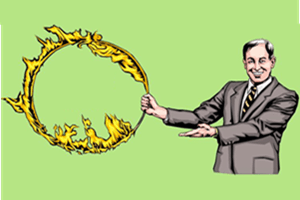In the December 10, 2019 Ask The Headhunter Newsletter a reader wants to know why employers ask irrelevant, roundabout interview questions.
Question
When an interviewer asks roundabout questions like, “What is your greatest weakness?” and “What is your greatest strength?”, what do they hope to learn about you as a prospective hire?
Nick’s Reply

Those questions hint at why job seekers agonize for weeks or months “waiting to hear back” from employers that never should have interviewed them to begin with. Such questions are irrelevant to assessing a candidate for a job, so they don’t help the employer make a hiring decision.
Gratuitous interview questions
“What is your greatest weakness?” and “What is your greatest strength?” are two of the Top 10 Stupid Interview Questions. They tell you more about the interviewer than your answers would tell about you. Such gratuitous queries reveal that the interviewer knows too little about the job to intelligently assess whether you can do it.
Managers and some career experts suggest that those two open-ended questions tell the employer a lot about you. I don’t agree. Such questions distract both the employer and the applicant from the critical-path question in any job interview.
Can you do the work?
“Can you do the work?” is the very first thing any savvy interviewer needs to know about you. If you cannot show that you can do the work, the meeting should end right there. Your weaknesses and strengths are irrelevant. So is what animal you’d be if you could be any animal, and how many golf balls you estimate would fit in the Empire State Building. None of that “open-ended” palaver matters if you can’t do the work.
So the message is, beware this interviewer.
What should you do when you’re asked such lame questions? Take control of the interview. Do it politely but firmly.
How to Say It
“I’d like to show you how I’d do this job, if you will permit me. If I can’t do that, then you shouldn’t hire me. So that I’m not wasting your time, will you please outline three key deliverables you’d like to see from a new hire? That is, if you hired me, what would you want me to do, fix, change, create, improve after three months on the job, then after six and 12 months? I’ll do my best to show and explain how I would do the work, so that you may accurately assess me.”
If you’re not ready to make that offer, then you’re not prepared to discuss the job and you have no business in the interview. Pull it off, and any good manager will fall at your feet. (See Good Interview Questions: You need just one.)
Don’t waste your time
If the manager cannot define the deliverables he or she wants, or doesn’t “get” what you’re offering, then you’re wasting your time. It’s better to be spared early, rather than to invest hours of time and energy, not to mention the agony you’ll be spared “waiting to hear back.”
When managers ask canned, indirect interview questions rather than directly assess your ability to do the job, they are going to waste their time and yours. If that’s what you encounter, raise the standard and offer to show the manager how you’d do the job.
Can you judge an employer by the interview questions they ask? What’s the best question you’ve been asked? I’m sure you’ll share the worst! Have you ever taken control of a job interview that was going nowhere fast?
: :


